
Stephanie Houng
What is Rice Water and Is It Good For My Skin?
Here's the science showing the benefits of rice water. And what is Pitera and how is it different from fermented rice water?
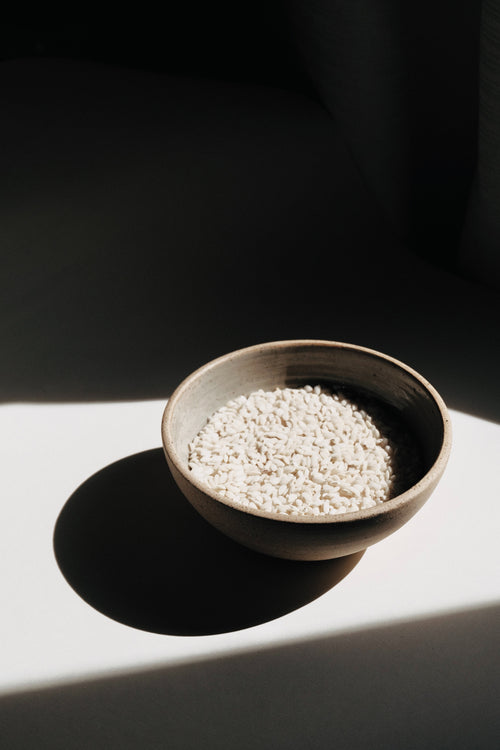
Ever wondered what's behind the flawless, radiant skin that's all the rage in Japan and across Asia?
Well, it's not some fancy, modern-day invention—it's good old rice water.
Yep, the stuff that originated and has been used for ages in Japan has now taken the global beauty scene by storm. It's popping up everywhere, from celebrity skincare routines to viral TikTok and Instagram videos.
But what makes rice water so special?
Is rice water good for your skin?
What is SKI-II Pitera?
Is Pitera worth all the hype?
And what’s the buzz around fermented rice water?
Stick around! We’re about to stir the pot (of rice water), looking at its benefits, understanding the magic behind Pitera, and even comparing the OG rice water skincare pioneer brand SK-II with new contemporaries.
We’ll be answering all your most burning questions and give you the lowdown backed by science in this post. Ready to get started?

Today, the women of the Yao tribe in rural China continue the tradition, rinsing their long black hair with rice water—a secret they attribute to maintaining their lustrous locks well into old age.
Summary and Key Takeaways
Rice water is scientifically proven to provide benefits for your skin and not only has tons of nutrients but is also highly bioavailable and naturally antimicrobial.
Rice water is very safe and gentle on your skin.
Making rice water is simple, but many people make it incorrectly. There is a scientifically proven best way to make rice water correctly.
Fermented rice water has significantly more skin-loving nutrients than plain rice water.
Table of Content
- Is rice water good for my skin?
- Is rice water safe for my sensitive skin?
- How do you make rice water?
- What is Pitera? Is Pitera worth it?
- What is Galactomyces and is it good for my skin?
- How to make fermented rice water for skin
Is Rice Water Good For My Skin?

The first documented use of rice water for hair traces back 1300 years to Heian-era Japan, where court women harnessed its power for unparalleled shine, sleekness, and strength.
Ready for a blast from the past with rice water, the age-old beauty secret of Asia?
Not only has it been a staple for skin, but rice water for hair has also been a long-time love in traditional beauty practices!
Rewinding to Japan's Heian period, which, by the way, was over 1300 years ago, court women were already tapping into the benefits of rice water. They were regularly treating their luscious, long black hair with rice water, ensuring every strand was healthy, strong, and shimmered gloriously like their silk kimonos.
Who wouldn’t love such a natural hair care secret weapon way back then?
Rice water has been used by Japanese women for over 1300 years and is prized for its hair and skincare benefits.
It’s not just about fabulous locks, though.
Rice water is like the multitasker of the beauty world. We're talking moisturizing, antioxidant, and healing properties that have cooling and soothing effects on the skin. It’s even said to boost circulation, fade hyperpigmentation, and calm inflammation, all while making your skin soft and radiant.
Believe it or not, rice water is even thought to offer a little shield from the sun when it’s left to linger on the skin.
But hold on, let’s not get entirely carried away by the beauty whispers. Where does science stand on this?
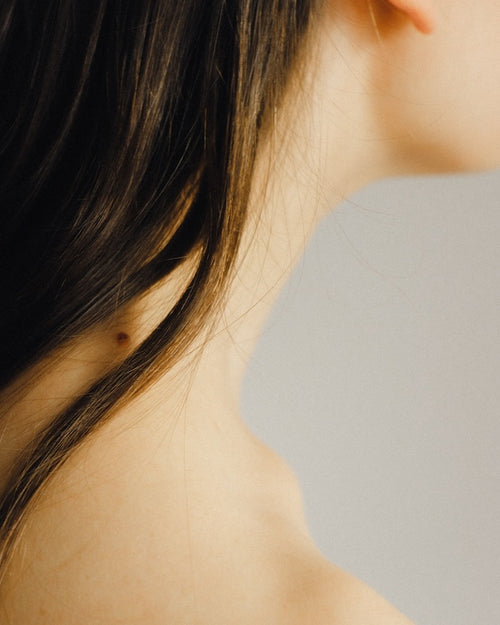
The Research:
The Science Behind Rice Water's Glow-Up
Who doesn’t love a good research-backed beauty tip? Let's dive into the research and find out what makes it such a hit, backed by science!
The Amazing Nutrients in Rice Water
A study titled “Rice Water: A Traditional Ingredient with Anti-Aging Efficacy” listed it as being packed with carbohydrates (hello, starch!), fat, protein, gluten, cellulose, hemicellulose, sugar, and a cocktail of vitamins and minerals. Not only is it one of the gentlest skin cleansing agents, rice water also brings vitamins like B1, C, E, and minerals, that can potentially shrink those pores and brighten, tighten, and soften your skin. It's like a mini spa in a bowl!
Let's Talk Bioavailability
Let’s talk about your skin, that protective barrier of yours.
Like an overly enthusiastic bouncer, it’s a bit picky about what it lets in. It keeps out the disruptive party crashers, but can also prevent the good guy compounds from entering.
However, the same study showed that rice water has a whopping 50% bioavailability rate. In simple terms? Half of all those skin-loving compounds in rice water can penetrate your skin.
When they compared it to a control (vitamins mixed into distilled water), it outperformed it massively (which only had an 8.6% bioavailability).
Improved Skin Hydration
Here’s a hydration boost for you–the same study discovered that, compared to the control, rice water amplifies your skin’s ability to retain moisture by over 10%.
The Antioxidant Boost
In simple terms, our bodies produce certain molecules called Reactive Oxygen Species (ROS).
Now, while a little ROS is okay, too much can wreak havoc, leading to issues like cell damage.
The solution? Antioxidants!
They're like peacekeepers that neutralize the bad guys (ROS) and prevent oxidative stress. The study showcased that rice water is rich in these antioxidants, reducing the ROS levels by a staggering 89% versus the control.
Marto, J.M., Neves, A.T., Gonçalves, L., Pinto, P., Almeida, C.M., & Simões, S. (2018). Rice Water: A Traditional Ingredient with Anti-Aging Efficacy. Cosmetics, 5, 26.
Antimicrobial & Antifungal Effects of Rice Water!
Can you believe that rice water might just be your unexpected ally in the fight against diarrhea-causing bacteria and even dandruff-causing fungi?
Yep, you read that right! A study revealed that both boiled and soaked rice water aren’t just your skincare buddies; they pack a punch with antifungal and antimicrobial properties.
Thank zinc and selenium – the naturally occurring elements in rice water – for that. Plus, the starch in rice water isn’t just filler; it actively promotes skin healing and defends against water and nutrient loss from damaged skin.
Awasthi, Shruti, Anwesha Das, and Chumki Bhattacharjee. 2011. “Physico-Chemical Properties of Different Kind of Rice Water and Their Effect on Diarrhoea Causing Bacteria and Dandruff Causing Fungi”. Journal of Phytology 3 (11).
Glow Up with Essential Compounds for Your Skin!
Ever thought about Vitamin B6? Probably not, but this busy vitamin is involved in over 200 chemical reactions in your body, contributing to everything from brain growth to transporting oxygen through your bloodstream.
And when it comes to your skin, it's a little marvel, working to reduce sebum production, curb breakouts, maintain moisture levels, and even act as an antioxidant.
Let’s not forget about manganese – a true skin savior. It aids your body in producing collagen and assists in healing skin damage. Rice water doesn’t slack in these areas.
A study pointed out that rice water is loaded with Vitamin B6 and manganese, standing out even when compared to other commonly available skincare compounds.
Larasati, T.D., Putri, N.P., Niawanti, H., Pratiwi, L.E., & Gedoan, D.E. (2022). Characterization of Natural Face Toner from Rice-washed Water. Jurnal Sains dan Terapan Kimia.
Our Recommended Reads 🌾
Is Rice Water Safe?
Rice Water: A Skin BFF That’s in for the Long Haul!
Just in case you were wondering if you can use rice water for the long term, the answer is: Absolutely!
Multiple studies give it a thumbs up for continuous, extended use. Even if your skin throws a fit with other products, rice water is gentle and mild, making it a safe pick for those with sensitive skin!
pH Levels: Why It Matters and Where Rice Water Stands
Pop quiz! Do you know about the pH levels in your skincare? If you’ve been nodding off in chemistry class, here’s a refresher.
Think of pure water with a neutral pH of 7, while your skin is most comfortable at a pH of around 5. You don’t want skincare products that are super alkaline (pH above 10) or super acidic (pH below 4).
Good news is rice water sits pretty with a neutral pH level of 6-7. Meaning, it doesn’t throw your skin’s natural barrier out of whack and helps to keep those pesky breakouts at bay, according to a study (Characterization of Natural Face Toner from Rice-washing Water).
Larasati, T.D., Putri, N.P., Niawanti, H., Pratiwi, L.E., & Gedoan, D.E. (2022). Characterization of Natural Face Toner from Rice-washed Water. Jurnal Sains dan Terapan Kimia.
The Golden Rules of Rice Water
Across the board, properly prepared rice water is dubbed safe in all the studies we’ve peeked at, but like every skincare hero , there are ground rules:
Safety First: From young to old, men to women, all skin types seem to love rice water. But a word of caution - if rice is on your allergy list, best to give this a pass.
Patch Test: Before diving head-first into a rice water routine, try a little spot test. It's like a skincare dress rehearsal! If your skin throws a tantrum, step back, and maybe have a chat with a dermatologist.
(EXTREMELY IMPORTANT)
Make Rice Water the Correct Way: Making rice water isn’t rocket science, but there's a method to the madness. The internet can be a wild place, and not all DIY rice water guides get it right. Don’t cut corners, especially with the fermented version. If not prepared correctly, you could miss out on all the good stuff or even end up with a not-so-great contaminated batch.
How Do You Make Rice Water?
Think you know how to make rice water? Just a quick soak, a few swirls, and voila, right? If only it were that easy!
While rice water boasts remarkable benefits for both skin and hair, tapping into its full potential requires a little nuance in preparation.
Although it might seem like a straightforward concoction, there are quite a few variables to consider:
- What type of rice should you use when making rice water?
- What brand of rice is best when making rice water?
- What’s the best method to make rice water?
- What type of rice should you use?
- Which brand of rice is optimal?
- What’s the gold-standard method for preparation?
- To toss or not to toss the first rinse?
Lucky for you, we’ve sifted through the research to bring you expert tips on crafting the most effective rice water. And yes, there is a method to achieve optimal results. Ready to plunge into the details?
What type of rice should you use when making rice water?
Here’s the good news: you can technically make rice water with all kinds of rice, from brown rice to long grains like jasmine and basmati to short grain Japanese rice. Let’s also not forget the polished rice used for sake and mochi.
But which rice is the most optimal for extracting nutrients for rice water?
There’s no doubt that when it comes to your diet, brown rice is the nutrient champion, packing anywhere from 1.3-10x the nutrients of its white counterpart.
But, when it comes to your beauty routine, short-grain rice, particularly Japanese or sake rice, is your best bet.
This is because when making rice water, you want the nutrients in the rice to be extracted into the water; the outer bran in brown rice prevents this extraction from happening.
Secondly, short-grain rice tends to be starchier so the beneficial compounds more readily get extracted into the water.
The research found that rice water made from white rice had 1.1 - 4.6x better extraction rate than those made with brown rice.
What brand of rice is best when making rice water?
Think about it - when you're prepping rice water, you're extracting everything the rice carries. So, yes, that includes the not-so-great stuff too, like dust, heavy metals, and pesticides. No one wants a facial rinse with a side of contaminants, right?
That’s why choosing high-quality, pesticide-free, organic rice proves paramount when crafting rice water.
You might be wondering, besides the pesticides and dust, what are the heavy metals that might find their way into your rice water? If you’ve navigated the rice aisles, you know there's a range from budget-friendly to top-shelf options, and as you might suspect, that price tag often reflects quality, and thereby, the presence of undesirable compounds.
Let’s get into the nitty-gritty:
What are some of the non-beneficial or harmful compounds that can be found in lower-quality rice?
Aluminum: A familiar name in cosmetics, used to preserve color and act as a thickening agent. Though it's deemed safe, it doesn’t bring any health benefits to the table.
Nickel: Sometimes used to add color in cosmetics, nickel comes with a warning label for those with sensitive skin, as it may induce rashes and allergic reactions, especially for those navigating life with atopic dermatitis (eczema).
Arsenic: Arsenic is naturally present in nature and the environment, so it gets into the food and water supply and is impossible to eliminate it from our food supply. However, rice does have a tendency to absorb more arsenic than other grains so it’s important to get high quality rice that has been grown in clean environments with clean water. High quality rice water will usually have around 2-30ng of Arsenic per gram of rice water (the international standard that is generally considered safe is 3000ng per gram). According to the FDA many cosmetic products such as blush, eye-shadow, foundations contain up to 3000ng per gram of arsenic, so quality rice water is perfectly safe.
What’s the best method for making rice water?
Navigating through the numerous variables in preparing rice water—whether to use intact or ground rice grains, to pre-wash or not, determining the soak time, and choosing between cold or boiling water—brings numerous possibilities into the rice water preparation process. What’s the optimal combination, you ask?
Let's dissect the research-backed verdict:
Intact vs. Ground Grains: Intact grains seemingly take the crown for effective compound extraction over their powdered counterparts.
To Prewash or Not: A gentle prewash is beneficial for eliminating undesirables like dirt and pesticides. However, moderation is key to preserving the beneficial compounds.
Cold vs. Boiling Water: While boiling water extracts a bounty of antioxidants, it’s a double-edged sword as some beneficial compounds may lose their efficacy in the heat.
Soak Time: Patience is virtue—prolonged soaking ensures a richer extraction of the rice’s compounds.
Tying it All Up
That’s a lot to consider.
So what’s the final score on the best method for making rice water?
The studies recommend that to get the best rice water, you get high quality organic white rice and soak it in cold water for 30 mins without pre-washing it. This results in the best balance of optimal extraction of beneficial compounds while minimizing the extraction of harmful compounds.
1Marto, J.M., Neves, A.T., Gonçalves, L., Pinto, P., Almeida, C.M., & Simões, S. (2018). Rice Water: A Traditional Ingredient with Anti-Aging Efficacy. Cosmetics, 5, 26.
2Welna, Maja, Anna Szymczycha-Madeja, and Pawel Pohl. 2023. "Rice Water—More a Source of Nutrition Elements or Toxic Arsenic? Multi-Element Analysis of Home-Made (Natural) Rice Water and Commercialized Rice-Based Products Using (HG)-ICP OES" Processes 11, no. 9: 2674. https://doi.org/10.3390/pr11092674

Unlock Radiance from Your Kitchen! Achieve a Glowing Complexion in Just 14 Days.
Easy ways to see if your skin is getting all the nutrients it actually needs? Get the Ultimate Guide to Using Rice for Better Skincare
- Learn how to create your own rice water serum.
- Step-by-step guide on creating your own fermented rice body and face mask.
- Get your soak on, and learn how to whip-up a Sake-tastic bath bomb.
- Plus 27 pages chock full of minimalist skincare tips!
What is Fermented Rice Water?
Fermented Rice Water Unveiled: The Sake Secret
By now, you must have stumbled upon the term "fermented rice water.” It’s been stealing the skincare spotlight, but what really lurks behind its seemingly vague name?
Is fermented rice water just rice water left unchecked to “ferment” on its own?
Spoiler alert: The answer is a resounding no!
“Fermented rice water" is actually none other than Sake, the iconic Japanese rice wine!
We’ll explain more. But first, let’s debunk a pervasive myth peddled by various DIY guides: simply leaving rice water out on your kitchen counter or in your fridge does NOT turn it into fermented rice water (sake); but rather, you’ve just made a rancid jar of spoilt rice water and bacteria.
Imagine expecting milk left out to magically become cheese - if only that were true…
The truth? Creating Sake demands a meticulous, nuanced fermentation process involving Koji (Aspergillus oryzae) and Sake yeast (Saccharomyces cerevisiae). Learn to make authentic fermented rice water with this Japanese fermentation expert-approved tutorial.)
Sake's fermentation isn't just transformation; it's elevation. Koji and yeast work wonders, turning rice compounds into an enriched blend brimming with antioxidants, vitamins, and over 100 vital skin nutrients. (Curious about the genuine fermentation journey? Dive deeper here.)
 Click Here to Learn the Sake Brewer Approved Method to Making Fermented Rice Water
Click Here to Learn the Sake Brewer Approved Method to Making Fermented Rice WaterSimply leaving rice water out on your kitchen counter or in your fridge does NOT turn it into fermented rice water.
That's like leaving milk out hoping that it magically turns into cheese...
What is Pitera? And what is Pitera made from?
“Pitera" may ring a bell for skincare enthusiasts, notably for its ties with the esteemed Japanese skincare brand, SK-II — the initial pioneering brand to scientifically unveil the benefits of sake's fermented rice water.
What is Pitera?
Pitera is their trademarked blend, melding Galactomyces Ferment Filtrate, Saccharomycopsis Ferment Filtrate, and a rich compilation of 50 other advantageous nutrients.
Nowadays, Galactomyces can also be spotted in offerings from newer brands, such as Cosrx.
Galactomyces (Pitera): A Deep Dive into Its Skin Benefits
What exactly makes Pitera a coveted skincare ingredient?
Is Galactomyces truly beneficial for your skin?
Research sheds promising light on this. In the International Journal of Science and Research, researchers found that Pitera/Galactomyces boosts the skin's moisture retention in just 30 minutes.
But that's not all. Makeup removers that incorporated fermented rice water compounds, including Galactomyces, were found to work more effectively. Given that many makeup removers can strip the skin of its natural moisture, the addition of Galactomyces ensured that the skin remained hydrated after cleansing.1
A study from the Journal of Clinical Medicine offers more intriguing findings about Galactomyces.
This compound activates the skin's aryl hydrocarbon receptor (AHR), which improves natural moisturizing factors (NMF). It also supports the NRF2 function in our skin, giving it antioxidant defense against UV damage and inflammation. Plus, Galactomyces boosts cytokine IL-37 levels, helping the skin fend off allergies and reduce inflammation.2
1Khadge, S., & Bajpai, D.N. (2018). Extraction, Isolation and Evaluation of Pitera from Fermented Rice water and its Incorporation as Active in Bi-phasic Makeup Removal.
2Yan, X., Tsuji, G., Hashimoto-Hachiya, A., & Furue, M. (2022). Galactomyces Ferment Filtrate Potentiates an Anti-Inflammaging System in Keratinocytes. Journal of Clinical Medicine, 11.
Can fermented rice water improve my facial skin’s complexion?
Absolutely! Research from the Journal of Cosmetics and Dermatological Studies revealed that fermented rice water can significantly improve facial rejuvenation.
This study explored the skin's follicle-sulcus-crack complex (FSCC), which measures the level of dehydration and visible lines in the skin. Analyzing nearly 300 women of varying ages, they found that aging increases FSCC levels, meaning less moisture and more wrinkles in the skin. Yet, within just 14 days of applying a Galactomyces-infused serum, the study’s participants experienced enhanced skin hydration, leading to visibly fewer wrinkles and red spots.1
Even more excitingly, a long-term study from the Journal of Clinical Medicine monitored the skin condition of 86 Japanese women for 11 years. They found that regular application of Galactomyces concentrate not only reduced TEWL (trans epidermal water loss) from the skin but also reversed aging signs like wrinkles, hyperpigmentation, and overall skin roughness.2
Finally, yet another finding from the Journal of Clinical Medicine showed remarkable results. In a study involving over 100 women, applying Galactomyces serum twice daily led to smaller facial pores, smoother skin, and reduced redness in just one week.3
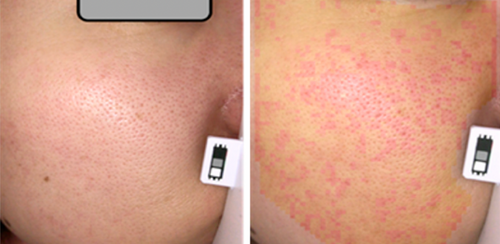
These two images show the before (right) and after (left) transformation after using fermented rice water for four weeks.
1Miyamoto, K. , Dissanayake, B. , Wanigasekara, S. , Fujii, K. , Yan, X. and Furue, M. (2023) Expanded Follicle-Sulcus-Crack Complex Is an Early Warning Sign of Facial Skin Aging: Improvement by Application of Galactomyces Ferment Filtrate-Containing Skin Product. Journal of Cosmetics, Dermatological Sciences and Applications, 13, 91-106. doi: 10.4236/jcdsa.2023.132010.
2Yan, X., Tsuji, G., Hashimoto-Hachiya, A., & Furue, M. (2022). Galactomyces Ferment Filtrate Potentiates an Anti-Inflammaging System in Keratinocytes. Journal of Clinical Medicine, 11.
3Miyamoto, K., Dissanayake, B., Omotezako, T., Takemura, M., Tsuji, G., & Furue, M. (2021). Daily Fluctuation of Facial Pore Area, Roughness and Redness among Young Japanese Women; Beneficial Effects of Galactomyces Ferment Filtrate Containing Antioxidative Skin Care Formula. Journal of Clinical Medicine, 10.
INÉ Skin Nutrient Bar: Your Key to Unlocking the Ageless Beauty of Fermented Rice Water!

Introducing the INÉ Skin Nutrient Bar
An Artisan Soap Bar Made with Japanese Sake
Immerse yourself in the transformative power of fermented rice with the Skin Nutrient Bar, meticulously crafted with 100% organic Sake Kasu, a legendary secret from ancient Japanese skincare rituals.
Each bar, lovingly crafted to preserve the full, potent benefits of Sake Kasu, is designed to cleanse, nourish, and rejuvenate your skin from head to toe—all in the meditative mist of your shower. Just as the Toji's hands glow from daily immersion in sake, your skin too can embrace the radiant benefits of sake.
- Free from Harmful Additives
- Vegan Friendly
- Non-Comedogenic
- Safe For All Skin Types
- No Artificial Coloring or Fragrance
Which One Is Better: SK-II or Cosryx? Is Pitera worth it?
Curious about the distinction between SK-II's Pitera and Cosrx's Galactomyces?
At its core, they’re both derived from the natural compounds in sake’s fermented rice water.
SK-II’s Facial Treatment Essence
Main Compound:
- 90% Pitera (which contains Galactomyces and 50 other compounds)
The remaining 10% of the mixture is made of:
- Butylene Glycol (helps with hydration and acts as a stabilizer)
- Pentylene Glycol (helps with hydration and acts as a preservative)
- Sodium Benzoate (preservative with antimicrobial properties)
- Methylparabein (paraben preservative)
- Sorbic Acid (preservative with antimicrobial and antifungal properties).
Cosrx’s Galactomyces 95 Tone Balancing Essence
Main Compound:
- 95% Galactomyces
The remaining 5% of the mixture is made of:
- Niacinamide (vitamin B3 that helps with hydration, skin firmness, and skin tone)
- Panthenol (vitamin B5 that helps with skin barrier function and has anti-inflammatory properties)
- Glycerin (helps your skin retain moisture and alleviates redness)
- 1,2-Hexanediol (preservative and stabilizer)
- Butylene Glycol (helps with hydration and acts as a stabilizer)- Betaine (antioxidant that also helps with hydration)
- Sodium Hyaluronate (hyaluronic acid that helps with the skin retain moisture)
- Allantoin (promotes skin healing)
- Xanthan Gum (thickener and stabilizer)
- Ethyl Hexanediol (preservative and solvent)
- Adenosine (helps with skin smoothing)
So Which One is Right for Me?
SK-II vs Cosrx, which one is better and why?
Product Formulation:
Cosrx has a higher concentration (95%) of Galactomyces vs SK-II (90%). However SK-II’s proprietary formulation tends to higher variety of compounds compared to Cosrx.
Consistency and Feel:
SK-II's Facial Treatment Essence has a water-like consistency, making it lightweight and easily absorbable, whereas Cosrx essences tend to have a gel-like consistency, which might feel more moisturizing but making it less absorbable by the skin.
Efficacy:
While there are no scientific studies comparing the two directly, users have said both seem to have similar affects on their skin.
Price:
Cosrx is often cited as a more affordable alternative to SK-II, making it a popular choice among individuals looking for budget-friendly skincare options.
Brand Recognition and Awards:
SK-II has a longer history and is often recognized in the beauty community for its high-quality products. For instance, Allure’s editor in chief has been using SK-II Facial Treatment Essence for a decade, and it has won the Best of Beauty award.
Which one is right for you?
If you are looking for a more affordable skincare line with higher concentrations of active ingredients, Cosrx might be a suitable choice. On the other hand, if you prefer a brand with a long-standing reputation and is slightly easier to apply, SK-II could be a better option.
Beyond Trends: A Timeless Elixir for Skin Rejuvenation
From ancient beauty rituals to today's skincare innovations, rice water remains a cornerstone of luminous skin.
Its natural benefits, ranging from hydration to antioxidant protection, are profound.
But the magic truly amplifies with fermented rice water, teeming with the transformative qualities of Galactomyces and 100 other skin nutrients. These components refine skin texture, combat signs of aging, and bestow a radiant glow that's grounded in science and tradition.
In this ever-evolving world of skincare, where new ingredients and products flood the market daily, it's sometimes the timeless classics, rooted in tradition and proven by science, that truly stand out.
Rice water, and more specifically, its fermented form, is a testament to this. With increasing scientific backing, it's evident that rice water isn't just a fleeting beauty trend; it's a rich legacy of natural skincare.
If you're seeking a natural upgrade to your skincare routine, look no further than the potent blend of rice water, and even more so, to its fermented version. Your path to rejuvenated, glowing skin might just begin in the rice fields.
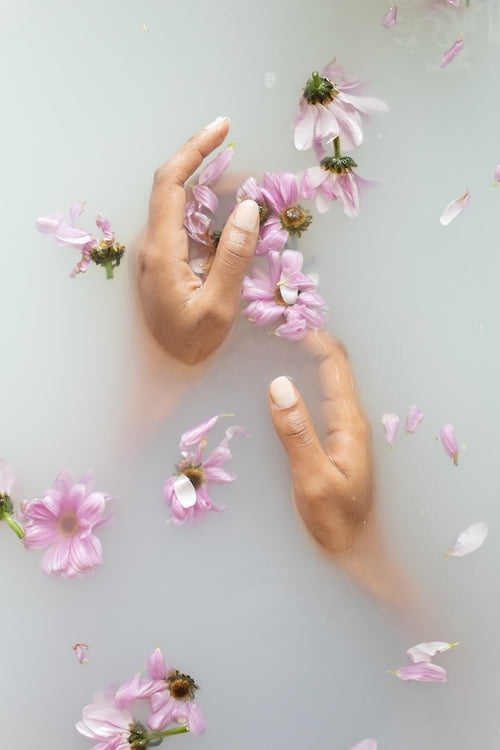
Please Also Read
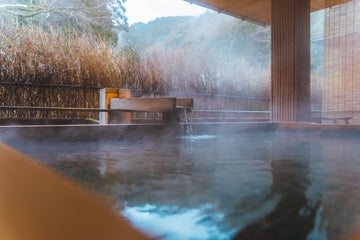
Types of Japanese Onsen You Need to Know About
If you ever travel to Japan, going to an onsen to experience the traditional hot spring culture is a must! Here are some tips on how to choose the right onsen.
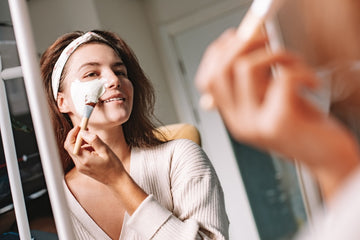
Make Your Own Sake Facial Mask
Learn how to make your own DIY Fermented Rice Sake Face Mask...sake brewer approved process!
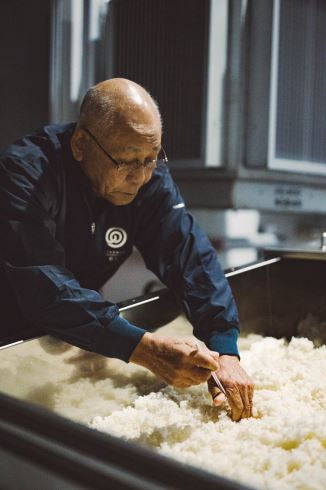
Traditional Process of How Sake Fermented Rice and Sake Lees is Made
From ancient Japanese beauty secrete, to modern skincare marvel see the end-to-end process of how Sake fermented rice wine is made.




